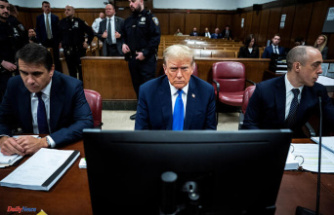The Brazilian Supreme Court has approved the extradition of Carlos García Juliá , convicted for his involvement in the killing of the lawyers of Atocha in 1977. The attack, perpetrated by a group of extreme right-wing, ended the life of five people in a dispatch labor Workers ' Commissions (not yet legalize) and shook up the Transition.
The ABC, under the words "Last Time", echoing the event on Tuesday, January 25. "The efforts made, it came in the knowledge that in the above-mentioned floor, third left of the farm 55 Atocha street , and law firm of labor, presented form inopinada the individuals, of medium-height and approximate age to the twenty-five years, who is wielding paths sub-machine guns, fired in bursts against the people in that place".
The tragedy that threatened the Transition"All close together and with the hands up" . These were the last words that they heard the victims of the tragic massacre of Atocha, that of 24 of January of 1977 . An episode that shook the foundations of the incipient Spanish democracy, within what is known as "Black Week" of the Transition.
The massacre was perpetrated in a dispatch labor Workers ' Commissions , linked to the still illegal Communist Party, which was located in the number 55 on Atocha street . It was eleven at night three right-wing they were there and were shot dead five people (three lawyers, a Law student and a clerk) and injured four others.
The killers were part of one of the numerous commands far-right linked to New Force and Phalanx, whose sole purpose was to eliminate those they considered "enemies of the Fatherland" and destabilize the new democratic system. Apparently, the killing stemmed from a conflict that was by the previous transport strikes.
In the early days of 1977, the strike of private transport travellers had paralyzed a good part of Madrid. Francisco Corredera Albadalejo, then secretary of the Union, Provincial Transport and Communications of Madrid and related to political parties of the extreme right, had had hard fighting with Joaquín Navarro. This was secretary-general of the Union of Transport of the vehicle.OO., also advisor of the firm, to labor where they committed the massacre.
The aim of the murderers was to "give a fright" to the communist leader Joaquín Navarro. But, when the terrorist brigade stormed into the office, she could not find him and the assailants opened fire on those present.
Judged and condemnedAfter the massacre, the killers were not taken the trouble to run away, believing himself protected by his political contacts. Almost two months after the attack, were arrested and brought to justice. The National court issued a decision in march of 1980.
The ruling was condemned Fernandez Cerrá and García Juliá, material authors of the facts, to 193 years in prison, and Francisco Albadejo to 73 years. This it was the first time that the extreme right was sitting on a bench, to be tried and convicted .
"In the farm 55 Atocha street were presented to individuals who, seizing the paths sub-machine guns, fired in bursts against the people of the place"The killing of the attorneys, labor is not only constituted one of the most black in the history of Spain., also became a leap forward for the consolidation of the Transition . A crowd of people gathered two days after the attack, before the Palace of Justice of Madrid. There began the courtship funeral march, in complete silence, to several of his victims. This time was referred to as a authentic sign for freedom .
Sentence incompleteGarcía Juliá was sentenced in 1980 to 193 years in prison as the author of nine counts of murder and illegal possession of weapons. However, his sentence was limited to the maximum of thirty years provided for by the law. In 1991, he was granted provisional release .
A year after she got the authorization to travel to Asuncion and work there, with the condition that occur each month in the Spanish Embassy in Paraguay. Not fulfilled what previstó and eloped thus initiating a journey of leakage for Latin america. In December, he was arrested by the brazilian authorities, which will come soon to their repatriation to Spain, where it will meet the 3.855 days of prison that are left.
Date Of Update: 12 September 2019, 19:01











